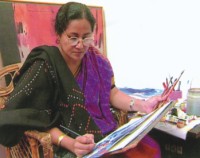|
Film
Films
on Women
Kavita
Charanji

Fauzia
Khan
|
Fauzia
Khan has essayed the roles of editor, director, in addition
to doing research and writing scripts for films. Among her
notable works are documentaries on the lives of six women
painters of Bangladesh called "Perception--The other
way" (1999). She has also made a documentary an Baul
singer Kangalini Sufia (2001-2002) called 'The Love Beggar',
The Budding Flowers (2002), which depicts the trials of
adolescence and 'Long way to go' (2004)a film based on the
realities that women face while performing their duties
as members of the reserved seats in the Union Parishad.
There
is clearly a distinct niche for such documentaries. As women
activists testify, women have been subjugated in the patriarchal
society and do not have a voice in social, family or even
personal affairs. Quite often, some mundane jobs have been
identified as jobs for women. A filmmaker with vision and
sensitivity can go a long way in rooting out this inequality
between the sexes.
"I
do women-oriented films," says Fauzia programme officer
of the audio-visual centre of Steps Towards Development.
"Women have an inferior social status and often do
not get what is due to them. My aim is to work for a more
equitable relationship between men and women." As a
woman, she points out she is on a strong wicket in dealing
with the lives of women.
Some
of her documentary films are derived from her own life and
are made independently. Take a forthcoming work on motherhood.
The film is based on Fauzia's own experience of abortion
several years ago and her mother's subsequent gentle tending
of her.
"That
unconditional relationship between mother and child inspired
me. Mothers always give and never get back from society.
Their contribution to family and society go largely unnoticed,"
maintains Fauzia.
Fauzia's
second documentary is based on theatre actress Shimul Yusuf.
Explaining the motivation for this film, she says, "
I wanted to depict the traditional acting style of Bangla
theatre, through Shimul."
 What
is the reaction of men to her work? "It is not that
an individual male is coming and attacking me. It is the
overall male psyche in a male-dominated system. Considering
all the obstacles, in a way I am in a better position than
other women and maybe males as well. I am working in the
audio-visual medium, which is unusual in Bangladesh,"
she says. What
is the reaction of men to her work? "It is not that
an individual male is coming and attacking me. It is the
overall male psyche in a male-dominated system. Considering
all the obstacles, in a way I am in a better position than
other women and maybe males as well. I am working in the
audio-visual medium, which is unusual in Bangladesh,"
she says.
Over
the years, filming technology has become more state-of-the
art. As a milestone, Fauzia cites the case of the digital
format. In her words, "The private TV channels coupled
with the digital format, have made filmmaking a less expensive
proposition. The technology gives one the chance to work
individually. All one needs is an idea, one's own computer
and a little camera. And there you have an independent,
low budget film."
Yet
there is much ground to cover for documentary films in Bangladesh.
Going back to her return to Dhaka after finishing her studies
at the Pune-based Film and Television Institute in 1996,
Fauzia faced what she calls "people's negativity about
me as a woman in films." What's more, there were few
people who had studied films and she was the first woman
to go overseas and study filmmaking. "Most people were
habituated to seeing women as actors, not behind the camera
as filmmakers and technicians," asserts Fauzia.
Another
hurdle, she believes, is the lack of an outlet for documentary
films. In the national arena, people are still not very
familiar with documentary films. There is a way, believes
Fauzia.
The
government has also lagged behind in giving grants for documentary
films and serious feature films, which do not have good
financial prospects. According to Fauzia, "only the
NGOs and donor institutions fund documentaries and they
have their own agendas. It is not that individual filmmakers
are free to do whatever they feel like."
Fauzia
has her list of women filmmakers whose work she admires.
Among them are Shameem Akhter (director ), Catherine Masud
( editor, technician, producer) and Yasmin Kabir (director).
She believes that Shameem's conceptualisation is excellent
and she shares with her the interest in women as subjects.
She is full of praise for Catherine's technical knowledge.
Then there is Yasmin, a documentary filmmaker who edits
and wields the camera along with directing films.

Fauzia
has long cherished the dream of working on a mainstream
film. As she says, "I wanted to do feature films. But
in Bangladesh this is difficult--in the sense that the kind
of theme I want to work on does not have commercial prospects."
Fauzia's work testifies to her vast talent which --given
her perseverance and skills--should help her make a breakthrough
in the mainstream.
Copyright
(R) thedailystar.net 2005
|
